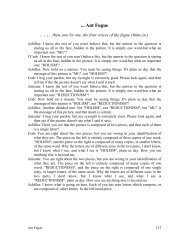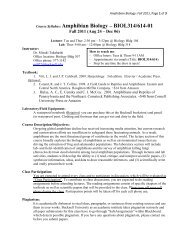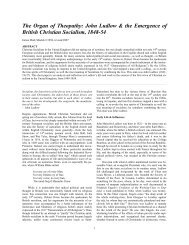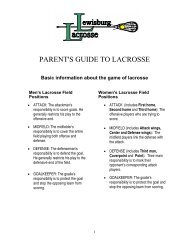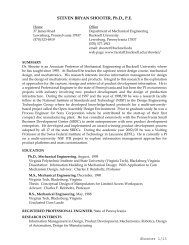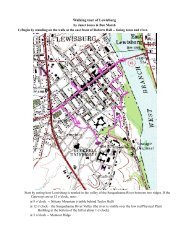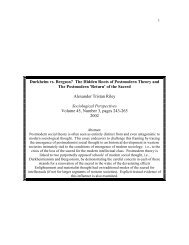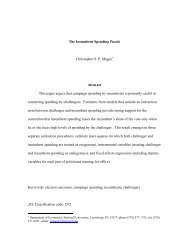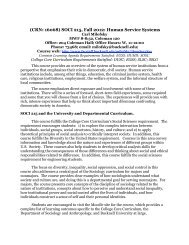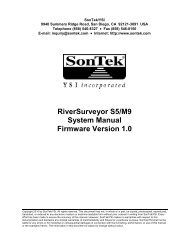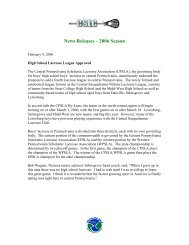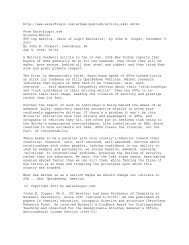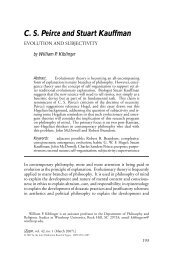Course Syllabus - Bucknell University
Course Syllabus - Bucknell University
Course Syllabus - Bucknell University
Create successful ePaper yourself
Turn your PDF publications into a flip-book with our unique Google optimized e-Paper software.
Conservation Genetics: Spring 2011, page‐1<br />
<strong>Course</strong> <strong>Syllabus</strong>: Conservation Genetics – BIOL320/620-01<br />
Spring 2011 (Jan 19 – May 12)<br />
Mon, Wed, and Fri: 1:00pm–1:52pm @ Biology Bldg 324<br />
Instructor:<br />
Dr. Mizuki Takahashi<br />
Office location: Biology Bldg 307<br />
Office phone: 577-1142<br />
mt027@bucknell.edu<br />
Textbook:<br />
Allendorf, F. W. and G. Luikart. 2007. Conservation and the Genetics of Populations. Blackwell<br />
Publishing Ltd, Malden, MA.<br />
<strong>Course</strong> Description:<br />
This seminar style course emphasizes the application of population genetics, molecular<br />
phylogenetic analyses, and reproductive genetics to answering biological questions in wildlife<br />
conservation. While student presentation and discussion will be an important part of the course, I<br />
will give lectures providing enough background information for student activities.<br />
<strong>Course</strong> Objectives:<br />
To provide an opportunity to understand values of biodiversity and genetic diversity, current<br />
conservation issues, importance of genetic information in conservation of living organisms.<br />
To develop an understanding of available molecular tools for conservation biology by which the<br />
class can learn how to choose an appropriate genetic tool for a given conservation issue.<br />
To provide an opportunity to read, critique, and interpret scientific papers addressing<br />
conservation issues using genetic data.<br />
To foster ability of scientific questioning, writing, and designing a study.<br />
<strong>Course</strong> Structure:<br />
The course consists of 15 weeks. In each week, I will present lectures in a Monday class and in<br />
the first halves of Wednesday and Friday classes unless examinations or student presentations are<br />
scheduled. While I will typically lead a discussion in the second half of a Wednesday class, an<br />
assigned student will lead a discussion in the second half of a Friday class. Class discussions will<br />
be based on reading assignments covering the topic that we learn a week before or during the<br />
week of discussion. For example, in Week 2, we will read and discuss values of biodiversity,<br />
which we will learn in Week 1. Email will be the primary tool for outside-of-class<br />
communication. Please check your <strong>Bucknell</strong> email account at least once a day. Scientific papers<br />
for class discussions will be provided via email and blackboard.<br />
Class Participation:<br />
Students are expected to attend every class and to participate in discussion, which will be<br />
evaluated as “Class Participation”. To meaningfully contribute to class discussions, students are<br />
expected to do reading assignments before attending lectures. The reading assignments consist of<br />
specific chapters of the textbook as well as scientific papers that will be provided to the class.<br />
Also, please turn off your cell phone during the class. Participation points may be taken off, if<br />
you use your cell phone during the class.
Conservation Genetics: Spring 2011, page‐2<br />
Plagiarism:<br />
It is academically dishonest to steal ideas, paragraphs, or sentences from existent sources and use<br />
them in your works. <strong>Bucknell</strong> <strong>University</strong> as an academic institute takes plagiarism seriously and<br />
all paper submissions by students have to go through “SafeAssignments” within Blackboard,<br />
which detects possible plagiarism. If you have any questions about plagiarism, please contact me<br />
before you submit papers.<br />
Conservation Issues Paper:<br />
Students will choose a contemporary topic in conservation genetics published within the last 24<br />
months in a national or regional newspaper (e.g., New York Times, Washington Post, Daily Item)<br />
or credited internet news sources (e.g., CNN and BBC) that are targeted for the general public.<br />
Please do not use articles from news sources that are geared toward people who are interested in<br />
science (Science Daily and Science News). Once a topic is found, students will study the<br />
scientific background of the topic by going through scientific literatures, which is often referred<br />
to in the newspaper article. The goal of this assignment is to assess how accurately and<br />
effectively scientific findings and knowledge are publicized. All topics and sources must be<br />
provided to and approved by the instructor by Feb 2. A 3-5 page paper (single-spaced, Times<br />
New Roman font 12, one-inch margins) will be developed that summarizes the topic, explains the<br />
conservation issue and how genetic tools are applied, and evaluates accuracy and effectiveness of<br />
the newspaper article by comparing the newspaper article with the scientific articles (Due: Mar 4).<br />
Students will also give 15-minute oral presentations on their papers (PowerPoint format). Scoring<br />
will be based on quality of paper (40 points) and oral presentation (20 points).<br />
Research Proposal:<br />
Students will choose a conservation issue whose solution and/or management would benefit from<br />
the application of genetic tools. This project can be an extension from the “Conservation Issue<br />
Paper” or a new topic can be developed from any sources. Brief summaries of research proposals<br />
(i.e., topics, outlines, and citations; a single page) have to be submitted to me by Mar 25. With the<br />
sound understanding of the chosen conservation issue, a research proposal (6-8 page, singlespaced,<br />
Times New Roman font 12, one-inch margins) will be developed that detail the<br />
conservation issue, how the issue benefits from genetic information, questions or hypotheses, and<br />
molecular analyses that will be carried out (Due: Apr 23). Research proposals will also be<br />
presented orally to the class (PowerPoint format, 15min). Scoring will be based on quality of<br />
paper (50 points) and oral presentation (30 points).<br />
Assignments and Grading:<br />
Class Participation and leadership of assigned discussion 80 pts (20%)<br />
Conservation Issue Paper and Oral Presentation 60 pts (15%)<br />
Quiz 1 20 pts (5%)<br />
Quiz 2 20 pts (5%)<br />
Midterm Examination 60 pts (15%)<br />
Research Proposal and Oral Presentation 80 pts (20%)<br />
Final Examination 80 pts (20%)<br />
Total 400 pts (100%)<br />
A = 400 – 360 pts (100-90%) B = 359 – 320 pts (89.9-80%)<br />
C = 319 – 280 pts (79.9-70%) D = 279 – 240 pts (69.9-60%)<br />
*Grades may be curved depending of the class performance.
Conservation Genetics: Spring 2011, page‐3<br />
COURSE SCHEDULE<br />
*Student activities are italicized with underlines for important dates.<br />
*Listed reading assignments are for students to better understand lectures within the assigned weeks.<br />
Additional papers will be provided for class discussions.<br />
Part I: Introduction<br />
Week 1: Jan 19W-21F<br />
<strong>Course</strong> Introduction<br />
Values of biodiversity and loss of biodiversity<br />
Scope of Conservation Genetics<br />
Reading: Allendorf & Luikart, 2007. Chapter1 (p3-14)<br />
Part II: Principles and Analyses of Conservation Genetics<br />
Week 2: Jan 24M-28F<br />
Population genetics I<br />
Hardy-Weinberg Principle<br />
Genetic Drift<br />
Reading: Allendorf & Luikart, 2007. Chapters 2, 5 & 6<br />
Week 3: Jan 31M-Mar 04F<br />
Population genetics II<br />
Effective Population Size<br />
Population subdivision<br />
Student-led Discussion 1<br />
Conservation Issue Article Due (Feb 02)<br />
Reading: Allendorf & Luikart, 2007. Chapters 7 & 9<br />
Week 4: Feb 07M-11F<br />
Population Genetics III<br />
Quantitative Genetics<br />
Student-led Discussion 2<br />
Reading: Allendorf & Luikart, 2007. Chapter 11<br />
Week 5: Feb 14M-18F<br />
Molecular Phylogenetics<br />
Quiz 1(Feb 16)<br />
Student-led Discussion 3<br />
Reading: Allendorf & Luikart, 2007. Chapter 16<br />
Week 6: Feb 21M-25F<br />
Genetic Tools for Conservation<br />
Inbreeding Coefficients<br />
Student-led Discussion 4<br />
Reading: Allendorf & Luikart, 2007. Chapters 3, 4, 13 & 14
Part III: Genetics and Conservation<br />
Week 7: Feb 28M-Mar 04F<br />
Conservation Issue Presentation<br />
Conservation Issue Paper Due (Feb 28)<br />
Week 8: Mar 07M-11F<br />
Conservation Issue Presentation (only Mar 07)<br />
Metapopulation and Fragmentation<br />
Reading: Allendorf & Luikart, 2007. Chapter 15<br />
Midterm Examination (Mar 11)<br />
<br />
Week 9: Mar 21M-25F<br />
Evolutionary Significant Units<br />
Student-led Discussion 5<br />
Research Proposal Summary Due (Mar 25)<br />
Reading: Allendorf & Luikart, 2007. Chapter 16<br />
Week 10: Mar 28M-Apr 01F<br />
Conservation Breeding<br />
Student-led Discussion 6<br />
Reading: Allendorf & Luikart, 2007. Chapter 18<br />
Week 11: Apr 04M- 08F<br />
Invasive Species I<br />
Quiz 2 (Apr 06)<br />
Student-led Discussion 7<br />
Reading: Allendorf & Luikart, 2007. Chapter 17 & 19<br />
Week 12: Apr 11M-15F<br />
Invasive Species II<br />
Student-led Discussion 8, 9<br />
Reading: Allendorf & Luikart, 2007. Chapter 17 & 19<br />
Week 13: Apr 18M-22F<br />
Use of Genetics in Forensics<br />
Student-led Discussion 10, 11<br />
Research Proposal Due (Apr 22)<br />
Week 14: Apr 25M-29F<br />
Research Proposal Presentation I<br />
Week 15: May 02M<br />
Research Proposal Presentation II<br />
May 05Th – 12Th<br />
Final Examination<br />
Conservation Genetics: Spring 2011, page‐4



